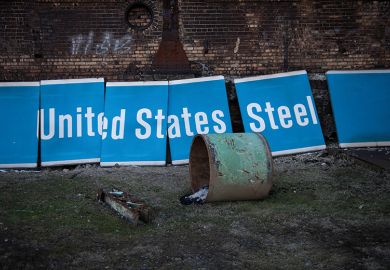US universities are taking several steps to improve equity within their institutional operations. A series of recent cases, however, has shown they are struggling as badly as ever to find answers for the myriad social challenges that exist right outside their gates.
Campus protests over housing, crime and community well-being have besieged leaders in recent months, with those involved often producing demands that partly or mostly sit outside the traditional responsibility of an institution.
The University of California, Berkeley drew widespread attention last year when the flagship campus of the nation’s top-ranked public system nearly lost a third of its incoming class because of persistent housing-related disputes with neighbours.
That case was just the tip of the iceberg, however. Others criticised for their approach to housing include Columbia University, which was faulted for driving up the cost of living close to its New York City base. Arizona State University, like UC-Berkeley, was blamed by its neighbours for letting noisy students get too far away from the campus. The University of Pennsylvania and Drexel University were accused of letting private developers push out low-income residents. Temple University just lost its first black president, in part because its students living in surrounding neighbourhoods had grown too fearful of crime.
Other community complaints across the US centre on the degree to which colleges and universities share their wealth, such as compensating their cities for municipal costs, and paying workers enough to live near the campuses they serve.
Universities clearly do provide major financial benefits to the areas where they are based, said one expert, Mark Abraham, the executive director of DataHaven, a non-profit organisation in the state of Connecticut that helps local communities assess their performance. There was abundant evidence, Mr Abraham said, that cities and towns suffering declines in their long-time manufacturing industries have fared much better when they have a strong local college or university.
DataHaven is based just off the Yale University campus, and Mr Abraham noted the recent sale of a less-than-one-acre parcel of land in New Haven for $11 million (£9 million) – for the construction of a $220 million life sciences real estate venture on behalf of the UK-based pension and insurance fund Legal & General – as a typical example of the great economic power of US higher education.
“However, beyond some point, economic growth is not correlated to well-being,” he said. “The distribution of resources and the structure of society is much more important to quality of life than whether GDP is rising quickly or not.”
This idea was central to a 2021 book, In the Shadow of the Ivory Tower: How Universities Are Plundering Our Cities, by Davarian Baldwin, professor of American studies at Connecticut’s Trinity College. The book chronicled multiple examples of US universities growing themselves at the expense of their surrounding environments – and putting up walls, sometimes literally, to avoid the consequences.
In the two years since then, Professor Baldwin said he has seen a number of encouraging efforts by universities to reconsider that mindset. Almost all those initiatives, however, have been pushed by students, faculty and outside community members – and rarely by campus leaders or administrators, he claimed.
“University administrations are holding fast, and sometimes doubling down on a profit-oriented approach,” he said. “But various other constituencies within universities are pushing a different vision.”
The few counter-examples, Professor Baldwin said, include Georgetown University, which is planning a substantial campus addition in downtown Washington, DC, away from its base in the city’s wealthy Georgetown neighbourhood; and Rutgers University, which has suggested it will explicitly consider community-oriented benefits as part of its ongoing labour contract negotiations.
Even then, the pathways look uncertain, he said. At Rutgers, two unions have already authorised a strike, calling the university’s contract offer less than a living wage. Georgetown’s School of Public Policy has asked Professor Baldwin for advice on the many details of how it should make an equity-minded expansion into a historically black neighbourhood, in such realms as construction contracts and procurement policies. Professor Baldwin said he was encouraged, yet is still waiting to see “if that’s just branding, or where it’s going to go”.
At Columbia, even a community leader fighting for the inclusion of low-income residents in a university-built housing development said he understands that both sides have real concerns. The activist, Dave Robinson, is president of the Morningside Heights Community Coalition, which wants to see subsidised units accounting for at least 30 per cent of the 200-plus units in a newly constructed building.
But, Mr Robinson acknowledged, Columbia is also looking to house its students, and is doing nothing fundamentally different than what any other property owner would do. “We're making a moral appeal to a private institution that is not legally obligated to do this,” he said. “I understand the institutional needs; it’s just they clash with other needs.”
Register to continue
Why register?
- Registration is free and only takes a moment
- Once registered, you can read 3 articles a month
- Sign up for our newsletter
Subscribe
Or subscribe for unlimited access to:
- Unlimited access to news, views, insights & reviews
- Digital editions
- Digital access to THE’s university and college rankings analysis
Already registered or a current subscriber?











